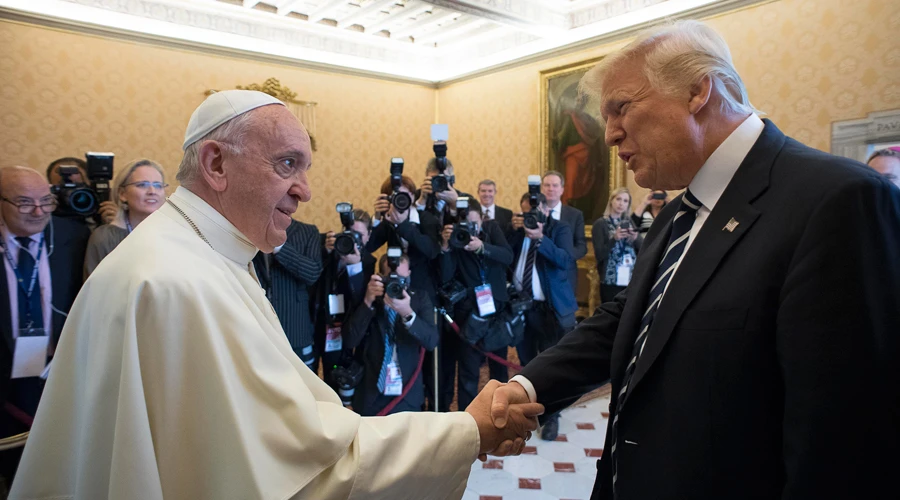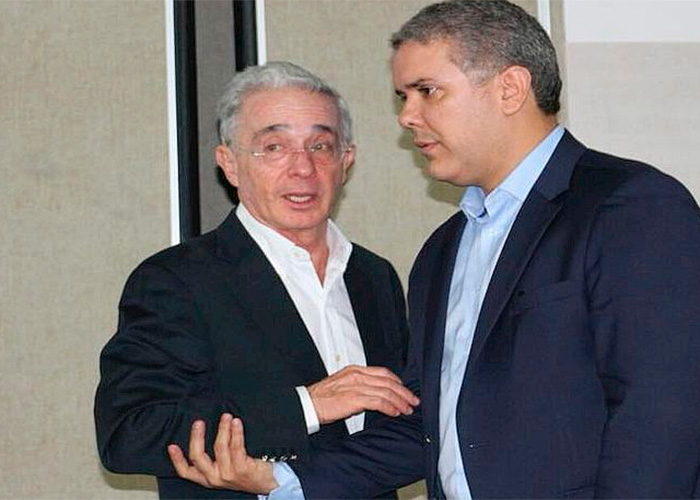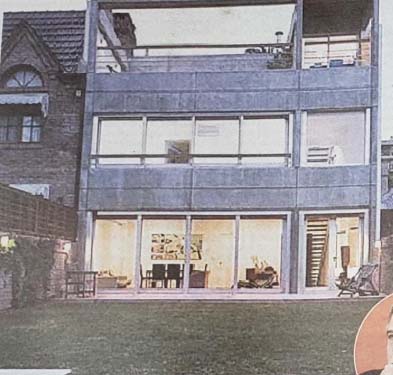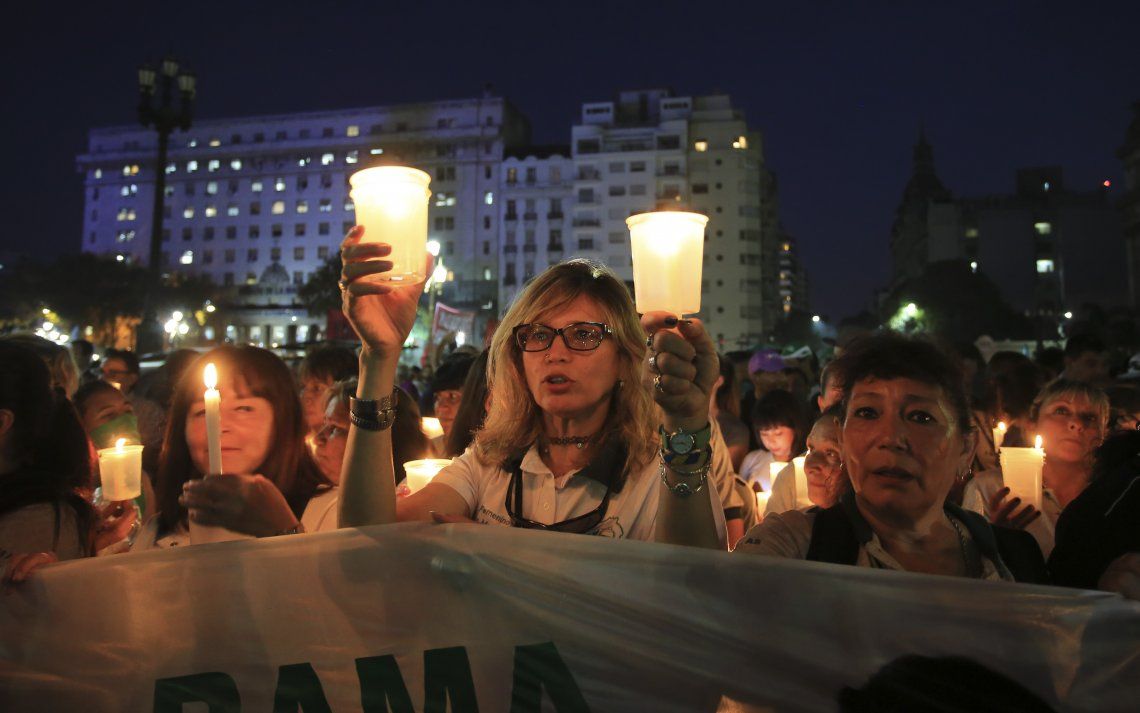peppertree
peppertree's JournalPope Francis criticized family separations before policy's reversal
Source: New York Times
Before President Trump’s about-face on Wednesday, Pope Francis criticized the administration’s separation of migrant children from their parents, saying in an interview earlier this week that “populism is not the solution” to a migration crisis that is transforming global politics.
In a rare sit-down interview, Francis told Reuters that “I am on the side” of the United States’ Catholic bishops’ conference, which called taking children from their parents “immoral” and “contrary to our Catholic values.”
In the face of mounting outrage, Mr. Trump had been sticking to a “zero-tolerance” policy intended to deter illegal immigration by prosecuting all adults apprehended crossing the United States border and putting their children in separate government-run shelters, including behind chain-link cage fencing.
By some counts, the government has separated nearly 2,000 children from their families in the past six weeks. But on Wednesday, Mr. Trump signed an executive order to prevent children from being taken from their parents.
Read more: https://www.nytimes.com/2018/06/20/world/europe/pope-francis-trump-child-separation.html
Pope Francis on Trump's child separation policy: Taking children from their parents “immoral” and “contrary to our Catholic values.”
Argentine ruling party ensnared in illicit campaign finance probe
A formal investigation was launched today in Argentina following revelations that President Mauricio Macri's "Let's Change" alliance used the names of hundreds of low-income residents to launder campaign contributions to congressional candidates in last year's mid-term elections.
The probe, headed by Federal Judge Sebastián Casanello and Federal Prosecutor Carlos Stornelli, was ordered pursuant to evidence uncovered by investigative journalist Juan Amorín of the progressive daily El Destape of at least 476 cases of public aid recipients fraudulently listed as "contributors" in campaign finance disclosures filed by the ruling right-wing alliance.
Their stated contributions averaged 2,400 pesos ($140 at the time), and totaled at least 1.16 million pesos ($67,000). Most were listed as coming from residents of Villa Itatí, a shantytown 6 mi southeast of Buenos Aires.
"I earn 200 pesos ($7) a day doing odd jobs, and putting bread on the table has gotten harder," Luis Jaime, one of the Villa Itatí residents improperly listed as a contributor, said. "I would never do a thing like contribute money - least of all to this government."
"They are shitty scoundrels!"
Party money
Argentine law mandates a punishment of three to ten years in prison to any candidate or campaign official convicted of laundering campaign contributions, when said offense exceeds 300,000 pesos.
Macri has faced numerous campaign finance probes since the 2015 election, which he narrowly won.
The largest party in the Let's Change alliance, Macri's hard-right PRO, declared 22 million pesos ($2.4 million at the time) in private contributions - but no less than 92 million pesos ($10 million) in unspecified party development expenses.
Campaign expenses, per Argentine electoral law, cannot be counted as "party development."
In the tank
Vice President Gabriela Michetti's think tank, SUMA, was raided in 2016 over 4.1 million pesos ($450,000) in unreported funds allegedly diverted to Macri's 2015 campaign.
The finances of other right-wing think tanks such as 'Fundar', 'Creer y Crecer', 'Formar', as well as Michetti's SUMA, have also faced campaign finance violation probes - though all these cases later stalled in the courts.
"Most members of the Macri administration either control or sit on the board of any number of think tanks or foundations that carry out political activities in parallel with Macri's PRO," Congressman Rodolfo Tailhade pointed out.
"These non-profits are in effect used to finance PRO operations."
At: https://translate.google.com/translate?hl=en&sl=es&tl=en&u=https%3A%2F%2Fwww.eldestapeweb.com%2Fexclusivo-cambiemos-utilizo-el-nombre-beneficiarios-sociales-blanquear-dinero-la-campana-n45194
An exultant Macri cavorts under a display thanking supporters for his unexpected win in last year's congressional mid-terms.
His Villa Itatí "contributors" demand an apology instead.
Conservative Ivan Duque poised to be Colombia's new president
Source: WSVN
Colombia election results show Iván Duque, the young conservative protégé of a powerful former president, is poised to become the country’s next president.
Duque holds a 12-point lead over leftist contender Gustavo Petro with nearly 97 percent of voting centers reporting in a preliminary count.
The 41-year-old Duque would take charge of the South American nation from outgoing President Juan Manuel Santos as it implements a still fragile peace accord after more than five decades of armed conflict. Duque soared in the polls as he promised to roll back parts of the historic accord with leftist rebels but not “shred it to pieces.”
Duque gained his front-runner status thanks in large part to support from Álvaro Uribe, the former president who is both widely admired and detested in Colombia.
Read more: https://wsvn.com/news/politics/conservative-ivan-duque-poised-to-be-colombias-new-president/
Colombia's President-elect Iván Duque (right) and his political mentor, former conservative President - and DIA-designated kingpin - Álvaro Uribe.
A defeat for President Santos' peace process?
Brazil's Supreme Court rules coercion against jailed former President Lula da Silva unconstitutional
The Supreme Court of Brazil ruled today that the use of coercion against former President Luiz 'Lula' da Silva to force him to testify was unconstitutional.
The 6 to 5 ruling thus renders inadmissible any testimony obtained from da Silva by Judge Sérgio Moro in March 2016, as part of the massive Lava Jato (Car Wash) investigation into reported bribery at the state-owned oil concern Petrobras.
The Supreme Court ruled that testimony obtained by force from someone not being formally charged or prosecuted, as was the case at the time, should be done as a last resort, and only if the witness remains uncooperative.
The ruling may be followed by da Silva's release, subject to a motion to that effect from District Attorney Raquel Dodge.
Da Silva, who governed Brazil from 2003 to 2011, has been in prison since April 8, after being sentenced by Judge Moro for allegedly accepting $1.2 million worth of bribes from engineering firm OAS - including a $700,000 beachfront apartment - in return for help securing contracts with Petrobras.
The former president denies the charges, noting that no corroborating evidence has surfaced against him of either bribery or of ownership of the beachfront apartment itself.
He accused the judge of instead seeking to prevent him from taking part in presidential elections this October, which polls show he would win handily.
Da Silva's successor and fellow Workers' Party leader, former President Dilma Rousseff, noted that the right-wing Michel Temer regime, mired in single-digit approval and corruption scandals of its own, “needs Lula imprisoned because they lack a candidate capable of winning” the upcoming election.
At: https://translate.google.com/translate?sl=auto&tl=en&js=y&prev=_t&hl=en&ie=UTF-8&u=https%3A%2F%2Fwww.eldestapeweb.com%2Fla-corte-suprema-falla-contra-el-juez-moro-y-se-espera-la-libertad-lula-n45161&edit-text=
Former Brazilian President Lula da Silva. Arguably his country's most prominent detainee, he maintains a commanding lead in polls ahead of presidential elections this October.
Argentine Central Bank president resigns amid financial crisis, IMF bailout
The president of Argentina's Central Bank, Federico Sturzenegger, announced his resignation today.
The announcement comes amid a collapse in the peso, which has lost one third of its value so far this year, and an unprecedented, $50 billion IMF bailout agreed to on June 8.
Sturzenegger, 52, was appointed by President Mauricio Macri the day he took office, on December 10, 2015. He will reportedly be replaced by Luis Caputo, Finance Minister for the last 18 months and a first cousin of Nicolás Caputo, best friend of President Macri.
Falling bicycle
Sturzenegger's tenure has been marked by the growth of a massive carry-trade bubble known locally as the “financial bicycle” - a bubble financed by the issuance of up to $60 billion in short-term, high-yield bills known as LEBACs.
The LEBACs, which yielded up to 15% in dollar terms during 2017, were typically rolled over, with investors using Sturzenegger's lax foreign exchange controls to wire over $22 billion in profits overseas last year alone.
The bicycle bubble, however, began to collapse last December as the country's current account deficit doubled to a record $31 billion in 2017, leading to investor fears as to its sustainability.
Central Bank reserves plummeted from a record $62 billion to $49 billion in the last two months as Sturzenegger sought to shore up the peso by raising the discount rate from 27% to 40%. The U.S. dollar nevertheless jumped from to 20 pesos in April, to 28.44 as of today.
Offshore and on
Caputo is himself a controversial choice, however.
Appointed Finance Secretary when Macri took office, Caputo, 53, was among a number of Macri officials and relatives found to have purchased millions in dollar futures contracts ahead of Macri's 40% devaluation on December 17, 2015.
While the devaluation led to 45% inflation by mid-2016 and a severe recession, Caputo's Axis fund made $50 million from betting on the move - a devaluation he himself arranged.
Caputo was later found, last November, to have managed a Miami-based offshore wealth fund, Noctua Partners, and three Caribbean affiliates with a combined portfolio of over $100 million. Their existence was confirmed this March by the U.S. SEC - but had not been declared in his financial disclosure, as mandated by Argentine law.
His Axis fund was also found last year to have received at least $30 million in investments by the nation's social security agency (ANSES). Axis was revealed in May profited by at least $700,000 during the recent peso crisis.
https://translate.google.com/translate?sl=auto&tl=en&js=y&prev=_t&hl=en&ie=UTF-8&u=http%3A%2F%2Fwww.ambito.com%2F924598-en-medio-de-una-nueva-corrida-cambiaria-renuncio-sturzennegger-y-caputo-sera-el-presidente-del-bcra&edit-text=
Macri's “dream team,” Sturzenegger (left) makes a point as Caputo (right) reacts incredulously to assurances that “the worst has passed.”
Chief of Staff Marcos Peña and Economy Minister Nicolás Dujovne look on between them.
Argentine Economy Minister linked to property tax evasion
Municipal records obtained by the Buenos Aires daily Tiempo Argentino show that Argentine Economy Minister Nicolás Dujovne listed his upscale home as a vacant lot for tax purposes.
The contemporary, 283 m² (3,045 ft²) house, in the affluent Belgrano section of Buenos Aires, was built for Dujovne in 2004 - but according to municipal tax records remained listed as a vacant lot until March 15 of this year.
Similar homes in Belgrano are selling for over $300 a square foot, making Dujovne's property likely worth around $1 million - over 40 times its assessed tax value of $22,000 as a “vacant lot.”
This is not the first tax-related controversy facing the media-savvy, 51 year-old conservative economist.
He became one of a number of Mauricio Macri administration officials to be listed in a tax “whitewash” scandal when news emerged this April that he had obtained amnesty in 2016 for $1.3 million in undeclared income kept offshore.
Dujovne was earlier photographed during the 2014 World Cup, in Brazil, holding an Argentine flag spray-painted with the words: “Up Yours, Revenue Agency.”
His appointment by Macri in January 2017 was widely seen as a signal to U.S. President Donald Trump, whose son Eric hired Dujovne's father, Berardo, in 2012 to design Trump Tower Punta del Este, a luxury condominium building in neighboring Uruguay.
This latest scandal has exacerbated the political firestorm over Macri's June 8 agreement with the IMF for a $50 billion stand-by credit line - a bailout which the IMF has tied to draconian budget cuts, including an 81% cut in public works spending.
Protesters, who gathered outside his home earlier today, improvised a small soup kitchen.
“Since you can't afford your property taxes,” one sign read, “we brought you breakfast.”
At: https://translate.google.com/translate?sl=auto&tl=en&js=y&prev=_t&hl=en&ie=UTF-8&u=https%3A%2F%2Fwww.tiempoar.com.ar%2Fnota%2Fla-mansion-de-dujovne-tributa-como-baldio&edit-text=
A nightmare on Mendoza Street? Dujovne's Buenos Aires home, until recently listed as an empty lot for municipal tax purposes.
Dujovne hosted IMF director Christine Lagarde here shortly before requesting a $50 billion bailout which the IMF has tied to deep budget cuts.
Argentina agrees to $50bn loan from IMF amid national protests
The International Monetary Fund has stepped in to shore up the Argentine economy with a $50 billion stand-by loan agreement.
Argentina requested assistance from the international lender of last resort on 8 May after the peso weakened sharply in an investor exodus. The dollar has risen 40% against the peso so far this year - the worst among the emerging markets.
Economy Minister Nicolás Dujovne said he expected the IMF board to approve the deal during a meeting on 20 June. After that, he said he expected an immediate disbursement of about $15 billion.
As part of the deal, which is subject to IMF board approval, the government pledged to reduce current account and fiscal deficits – which reached a record $31 billion and $38 billion, respectively, in 2017 (5 and 6% of GDP).
Fiscal deficits have been exacerbated by corporate, wealth, and export tax cuts decreed by President Mauricio Macri in 2015. Macri's attempts to pay for the tax cuts by imposing pension cuts and utility rate hikes of over 1000% have met with popular protest.
Current account deficits, in turn, have been fueled by soaring imports, which have risen by 20% annually even as exports remain flat, as well as ballooning payments on the foreign debt, which rose $52 billion last year alone.
The deal marks a turning point for Argentina, which for years shunned the IMF after a devastating economic crisis in 2001-02 that many Argentines blamed on IMF-imposed austerity measures. That crisis was preceded in December 2000 by a similar, $38 billion IMF stand-by credit line.
"How nice it is to share good news!" then President Fernando de la Rúa announced on national television at the time. He fled the presidential offices by helicopter amid riots a year later.
At: https://www.theguardian.com/business/2018/jun/08/argentina-loan-imf-protests-peso
Former Argentine President Fernando de la Rúa and Macri: The helicopter club?
Social Security and Medicare trustees confirm: GOP policies have hurt both programs
Source: Los Angeles Times
The publication of the annual trustees’ reports for Social Security and Medicare has become the occasion for some of the most consistently uninformed reporting on government programs of the year.
Within moments of their appearance, the Associated Press was tweeting, and later reported, that Medicare was projected to become “insolvent” in 2026, three years earlier than was projected last year.
Actually, no: The Medicare report projected that its hospital insurance trust fund, which applies to Medicare Part A, will be depleted in 2026. But since even then the program would be able to keep paying out more than 90% of scheduled benefits, it’s not anything like “insolvent.” As economist Dean Baker observes, at most it would be correct to say Medicare will face a “shortfall” in 2026, not insolvency.
The 2018 Trustees Report shows that the current program is fully affordable. Indeed, the United States can fully afford an expanded Social Security.
The more glaring oversight in Tuesday’s reporting on both programs is that the trustees made crystal clear that policies of congressional Republicans and the Trump White House have damaged the financial prospects of both programs. The GOP continually claims that it’s imperative to make both programs healthier to serve the 62 million people dependent on Social Security and 58.4 million covered by Medicare; the truth is that the Republicans are doing their best to cut the legs out from under both.
Read more: http://www.latimes.com/business/hiltzik/la-fi-hiltzik-social-security-20180605-story.html
Social Security and Medicare: Facing a GOP checkmate?
America's poor becoming more destitute under Trump: U.N. expert
Source: Reuters
Poverty in the United States is extensive and is deepening under the Trump administration whose policies seem aimed at removing the safety net from millions of poor, while rewarding the rich, a U.N. human rights investigator has found.
Philip Alston, U.N. Special Rapporteur on Extreme Poverty, called on U.S. authorities to provide solid social protection and address underlying problems, rather than "punishing and imprisoning the poor".
While welfare benefits and access to health insurance are being slashed, President Donald Trump's tax reform has awarded "financial windfalls" to the mega-rich and large companies, further increasing inequality, he said in a report.
U.S. policies since President Lyndon Johnson's war on poverty in the 1960s have been "neglectful at best", he said. "But the policies pursued over the past year seem deliberately designed to remove basic protections from the poorest, punish those who are not in employment and make even basic health care into a privilege to be earned rather than a right of citizenship," Alston said.
Almost 41 million people live in poverty, 18.5 million of them in extreme poverty, and children account for one in three poor, he said.
Read more: https://www.msn.com/en-us/news/us/americas-poor-becoming-more-destitute-under-trump-un-expert/ar-AAy8FOA
LBJ during his visit of West Virginia conditions in 1964. One of the GOP's great feats since then has been to turn the very people who benefited against him (and Democrats).
Argentina's Macri vetoes curbs on soaring utility prices amid IMF talks
Argentina's President Mauricio Macri on Thursday vetoed a law placing curbs on prices of electricity, gas and water, citing a need for fiscal discipline.
The opposition-sponsored law, approved hours earlier by the Senate after heated debate, would have rolled back prices for public utilities to November 30 levels, and linked future hikes to salary increases.
The bill, passed earlier by the Lower House on May 9, was passed by the Senate by 37 votes to 30, with five absentions.
"The law is already vetoed," Macri's chief of cabinet Marcos Peña told reporters, describing the legislation as "irresponsible."
Macri argued the price cuts would cost $3.9 billion at a time when the government is trying to reign in a ballooning budget deficit, which rose to a record $38 billion (6% of GDP), and seeking a $30 billion stand-by credit line from the IMF.
The Congressional Budget Office instead estimated the cost at $2.5 billion.
The bill would have rolled back hikes in public utility rates since December, which have averaged around 40%.
This round was one of several sharp hikes ordered by the Macri administration, which since April 2016 have averaged 1490% in electricity, 1300% for gas, and 1000% for water.
Utility hikes have cost the average Argentine household around 7.5% of their income - on top of an estimated 10% decline in real pay.
Opposition lawmakers noted, in turn, that profit margins for utilities and distribution firms, three of which are controlled by close friends of the president, skyrocketed in the first quarter of 2018 - in some cases to levels twice as high as in all of 2017.
"This is a direct theft against Argentine pockets by friends and supporters of the president," Senator Marcelo Fuentes charged. "They're no longer resorting to middle men, as they did in the 1990s."
At: https://www.yahoo.com/news/argentinas-macri-vetoes-curbs-utility-prices-amid-imf-155337796.html
Marching by candlelight against Macri's repeated utility rate hikes, Argentines are now paying 15 times more for electricity but enduring two thirds more blackouts.
Profile Information
Member since: Thu May 18, 2017, 12:36 PMNumber of posts: 21,624









